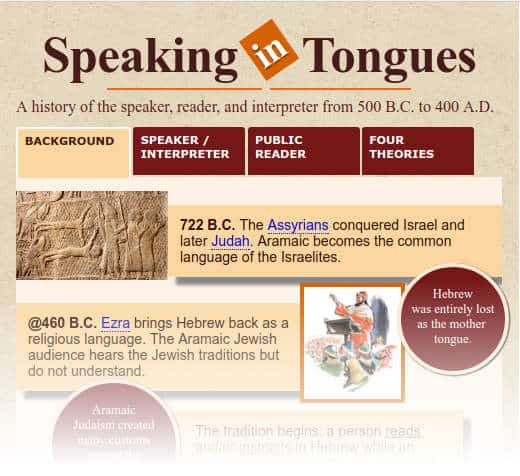A history of speaking, interpreting, and reading from 500 B.C. to 400 A.D. in Judaism and early Christianity.
An interactive infographic to help you navigate Paul’s world and how these offices later evolved in the Christian Church. Clicking on the image will bring you to the full interactive site.
IMPORTANT! Please note that the interactive file was an experiment in coding and design. The end result is that you have to wait a bit longer before the file is rendered, especially on mobile phones. My apologies in advance.
Paul’s mention of speaking in tongues in I Corinthians is deeply wrapped in the Jewish identity. The same goes for his understanding of speaking, reading, and interpreting of tongues. These rites have a rich history that goes well over 800 years. The initial origins are deeply connected to the times of Ezra.
Aeolic
Greek, Hellenic Judaism and the problem tongues of Corinth
A look at the problem tongues of Corinth being an internal linguistic struggle between Doric, Aeolic, and Attic Greeks. This is part 2 of an 7 part series on the mystery tongues of Corinth. Part 1, The Role of Hebrew in the Jewish Aramaic World, covered how Hebrew became the language of religion and worship …
Epiphanius on the Tongues of Corinth: Another Translation
Epiphanius, Bishop of Salamis, on the problem tongues of Corinth, as translated by Frank Williams
The Language of Instruction in the Corinthian Church
A look at the ancient Jewish rite of instruction in Hebrew with an immediate translation into Aramaic or local vernacular. How it potentially impacted the earliest Corinthian assembly and how this rite evolved in the church.
The tradition of Jewish instructors speaking in Hebrew lasted for centuries. It is no longer practiced in synagogues today but was an important function in Judaism around the first-century. This little-known practice had an important part to play in the Jewish identity, and as will be shown, was a factor in the tongues conflict in Corinth.
In order to better explain this practice and make an association with the Corinthian gathering, we must go into ancient Jewish literature and examine citations from a number of prominent Jewish authorities. For those not familiar with Jewish writings outside the Bible, their observations are obscure on the first read and takes some contemplation.
Notes about the Epiphanius Text on the Problem Tongues of Corinth
Translation notes regarding the Epiphanius text on the problem tongues of Corinth.
Epiphanius on the Problem Tongues of Corinth
A commentary of the work attributed to Epiphanius on tongues speaking in the first century Corinthian Church
The Epiphanius Text on the Tongues of Corinth in English
The Epiphanius text on the problem tongues of Corinth translated into English.
The Latin Epiphanius Text on the Tongues of Corinth
The Epiphanius text on the problem tongues of Corinth in the Latin
The Greek Epiphanius Text on the Problem Tongues of Corinth
A Greek source text on the Epiphanius passage about the problem tongues of Corinth
